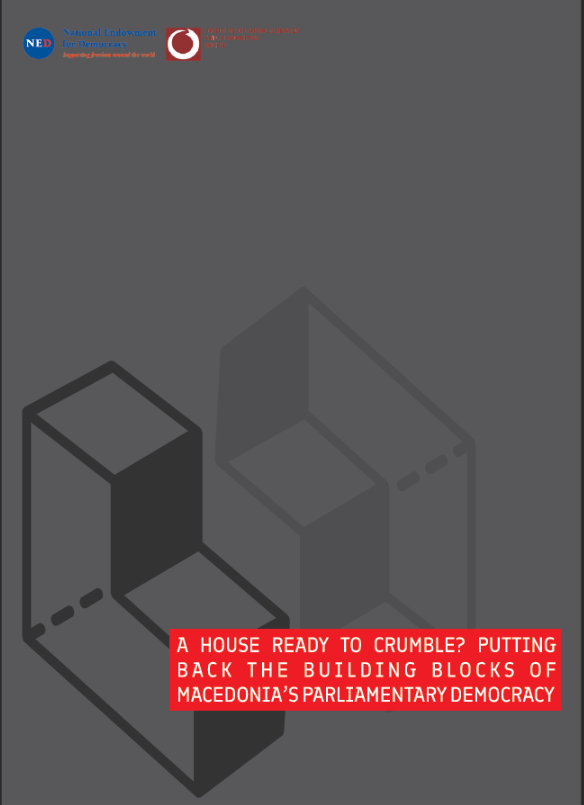
We kindly inform you that, as long as the subject affiliation of our 300.000+ articles is in progress, you might get unsufficient or no results on your third level or second level search. In this case, please broaden your search criteria.

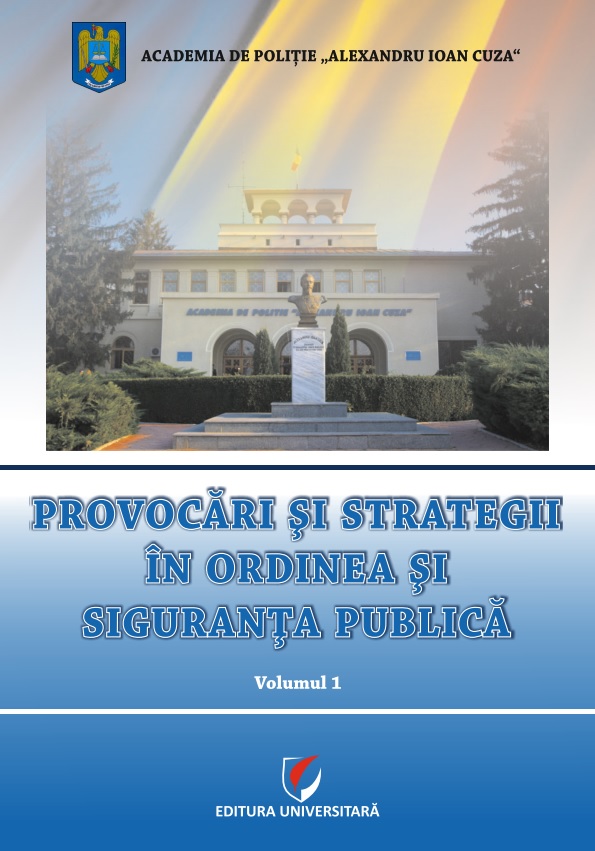
The state, through public authorities and institutions, must be concerned with knowing and keeping records of its inhabitants. The adaptation of the public administration to the evolution of the Romanian society determined measures that were realized through changes and transformations, also in the field of personal records. European influences determined the militarized system of records of persons to impose the acceleration of the establishment of public services of records of persons at the level of the public administration, which transformed the management of these entities. Between the two systems, administrative and internal (personal records), the central place was occupied by the citizen, the only beneficiary of the reorganization of the activity of the personal records services and who managed to impose his ideas in front of the authorities and public institutions, regarding the way of exercising the duties in the field of records of persons. The management practiced at the level of public services in the field of personal records has demonstrated the effective merging of two different systems (administrative and military), supported by the political one for the benefit of citizens.
More...
Created in 1945 primarily for the purpose of maintaining international peace and security, the United Nations (UN) plays a vital role in restoring and maintaining peace and stability in countries still affected by conflicts or large-scale crisis. This is achieved through peacekeeping missions and operations, which have constantly evolved and developed. Thus, there has been a gradual shift from the simpler, traditional missions and operations carried out in the spirit of Chapter VI of the UN Charter on the peaceful settlement of disputes, without any military objective or task, to today's multidimensional missions, which have to manage much more complex crisis situations. The United Nations is committed to promote cultural awareness and diversity in all its peacekeeping operations. In recent years, the United Nations has taken significant steps to improve the cultural awareness and sensitivity of its peacekeepers. This includes providing training on cultural competency and cross-cultural communication, as well as developing policies and guidelines that consider the unique needs of each mission. The UN perspective is that peacekeeping operations are often conducted in cultures very different from those of the peacekeepers themselves. As such, it is important for peacekeepers to be aware of the local culture and customs. By taking steps to promote cultural awareness and diversity, the UN is working to increase the efficiency of its peacekeeping forces.
More...
The author examines the juvenile delinquency, the act of participating in unlawful behavior as a minor or individual younger than the statutory age of majority. This explanation is accompanied by a thorugh analysis of the non-custodial measures which are regulated by article 115 of the New Criminal Code.Each measure is presented closely in order to have a better understanding of the role they have and the effects they direct on the minor.
More...
Organized crime is the panacea that history has faced since ancient times. Without a trace of denial, we can affirm that this scourge, organized crime, represents in itself a phenomenon that is identified in its formation with the appearance and consolidation of the first human communities, a situation that perpetuates itself until the moment T0 - the one that is identified, in essence, with the emergence of the modern society, developed and based on democracy. We are not wrong if we affirm that it, crime, represents in itself the content of a dark, dark, mysterious and unknown world that grew in content and manifestation, in the midst of people, together with them and whose traces and consequences can only be detected with the help of victims who have fallen prey to it, or who have allowed themselves to be caught in the nets of the dark phenomenon. The phenomenon of organized crime is a permanent threat to citizens, institutions and the economy, and the law enforcement authorities of the member states of the European Union collaborate both with each other and with the other states outside the European Union to combat this serious and organized scourge.
More...
Seen as a form of social deviance, delinquency represents a complex social problem as a result of the conjugated interaction between the individual and the environment. In fact, at the level of each society, it exists in one greater or lesser proportion, manifestations of transgression a norms that can take shape by relating them to certain criteria deviance or/and delinquency. The delinquent appears to us as an individual with a deficiency social maturation and at the same time, with social integration difficulties, which comes into conflict with the requirements of a certain value-normative system, including the legal norms.There is a difference between minors and juvenile delinquents, depending on capacity for criminal liability. We have minors who are not criminally liable and minors who are subject to criminal law sanctions. We also have non-custodial sanctions and restrictive or custodial sanctions.The reintegration of all minors who break the law is a sensitive issue. Reintegration services are designed to facilitate a youth’s transition from an out-of-home placement back to the community and family environment through collaboration between the youth and community service providers, and family to ensure the delivery of needed services and supervision. The overall goal is to assist the youth in becoming a productive citizen.
More...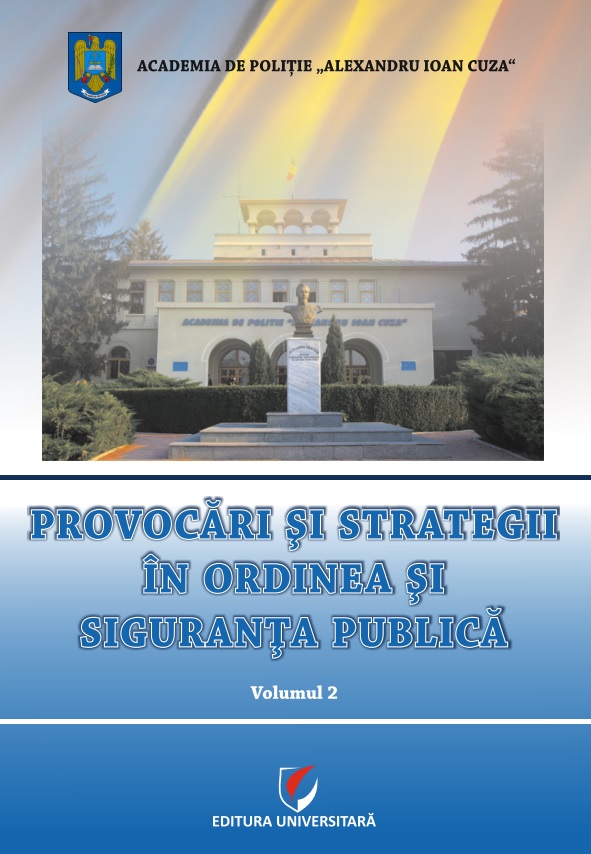
Terrorist threats to European security in the context of globalisation are of major relevance because of their global implications at the psycho-socio-individual level. This article proposes a qualitative analysis of the two terrorist attacks in Barcelona and Cambrils on 17-18 August 2017, claimed by ISIS members of the Salafist insurgent group. The approach brings to attention the issue of transnational threats and the anomie of terror partisans. The characteristics of the terrorist's personality profile, the pyramidal structure of involvement within a group, motivation, dynamics of actions according to intra-cellular organization, sphere of interest according to geographical location, level of involvement, influence of social, economic, cultural realities are brought under the microscope of analysis. A detailed analysis reveals the meticulousness of the practices of the groups, with a view to prevention and increasing the solidarity of the responsible institutions and civil society in combating the phenomenon.
More...
From 2022, an unprecedented armed conflict, in the last 50 years in this area of the world, is taking place on Romania's borders. Our country has shown a high level of generosity, hospitality and solidarity in its efforts to help Ukrainian refugees fleeing the armed conflicts in their homeland. The Romanian government has implemented policies and emergency measures to provide protection, access to vital services and social inclusion in national systems. As far as Romania is concerned, the characteristics of the refugee population have imposed an integrated approach to educational services. This approach was adapted to combat language barriers but also the reluctance of the refugees to call on educational services based on their personal conviction. Romania, through its leadership, realized on the occasion of the serious events that took place in 2022, that in the Romanian administrative systems the administrative barriers still remain significant and only through sustained and coordinated efforts (consisting of legislative interventions and changes in public policies and strategies) can they be overcome.
More...
Started in February 2022, through a military aggression by Russia, the war in Ukraine represents a threat to international security, but it can affect, without reaching the generalization of the conflict, the public security of the states of Europe, but especially of the states near the area of conflict.Like any military conflict, it generates a series of crises in the economic, social, humanitarian, public order etc. The huge wave of refugees transited the states bordering the conflict, to take shelter from the war, generating a series of social problems in the destination countries.The challenges to public security must be analysed from multiple perspectives: of crime, of public pressure determined by the population of the destination countries, of the economic and social impact that the European Union states must sustain for supporting the Ukrainian war effort, and subsequently for reconstruction of affected areas.In creating scenarios of crisis evolution, past events must be considered. The refugee crisis caused by emigrants from North Africa and the Middle East has caused a series of economic and social problems in Europe, sometimes culminating in population protest movements against population that have committed delicts or crimes.Refugees or migrants are not always just helpless people running from war or repression in their countries of origin; elements that are part of organized crime networks or, why not, terrorist can easily infiltrate among them.Starting from some certain aspects, the article wants to identify and analyse potential aspects that could affect public security, in the context of the Ukrainian crisis.
More...
This study provides an in-depth analysis of the public-private partnership in the execution of custodial sentences, focusing on the ethical, legal, and operational implications associated with this collaborative model. The research emphasizes the fundamental role of the public service in ensuring law compliance and the protection of the fundamental rights of prisoners, while also highlighting the need for careful management of the partnership in accordance with the ethical and deontological principles specific to the correctional profession.The detailed analysis highlights numerous benefits associated with the public-private partnership, including the improvement of the quality of correctional services, the optimization of financial and technological resources utilization, and increased operational efficiency. The involvement of private companies in prison management brings innovative perspectives and specialized expertise, contributing to the continuous development of the correctional system. Furthermore, collaboration between the public and private sectors can support the implementation of advanced programs for social reintegration and rehabilitation of prisoners, thereby facilitating the rehabilitation process and reducing recidivism rates.However, the public-private partnership also presents significant challenges. One notable drawback is the risk of the private sector being primarily motivated by profit-seeking, potentially leading to a decline in the quality of services provided to prisoners. Additionally, the increase in costs borne by the government is questioned, as private companies may demand higher remuneration than necessary to cover the actual costs. Contract management and monitoring activities within the partnership pose complex challenges, particularly when the interests of the two parties diverge significantly.
More...
The new geopolitical and geostrategic realities in the context of the war in Ukraine led to the exacerbation of common law crime and white collar crime and they represent a threat to National Security by making the integrated defence systems of National Security and public order vulnerable. An increase of corruption among civil servants and law enforcements led to the development of some unlawful underground economies powered by the war of Ukraine. Consequently, it results in a “sick” economy with direct effects on the regular citizen amplified by the arisal of new methods and forms of committing a crime in the context of the globalization of criminality which represent both a plague of this millenium and the biggest threat to the “healthy” development of a democratic state. Therefore, it is necessary to strengthen the legislative acquis and the system of public order and national security in order to fight against criminality in the context of new challenges that feed the anomie in society.
More...
Knowledge of the population is extremely important for specific policing activities as it can help to identify security problems and develop strategies to prevent anti-social crime. By knowing the population, police can better understand the culture, customs and values of the community. This knowledge can help identify vulnerable groups, those who may be vulnerable to crime or tempted to commit it. Knowledge of the population can also be useful in establishing effective communication between the police and the community. By understanding the needs and expectations of the community, the police can develop strategies to involve the community in crime prevention and crime fighting activities. In addition, knowledge of the population can help to identify high-risk areas, areas where offences against the law frequently occur or where there are public safety problems. In order to develop community-specific preventive strategies, the police need to identify and assess community-specific risk factors. Identifying and assessing risk factors are essential steps in the crime prevention process and can help to develop appropriate preventive strategies. One of the main objectives of population awareness in the work of preventing crimes harmful to society is to develop specific preventive measures tailored to the needs of the community.
More...
Migration has been a feature of human existence for centuries. People have always migrated in groups or individually to seek freedom, to escape poverty, to find new economic opportunities, to flee religious intolerance or political repression and this process is impacting both countries of origin and countries of destination. The issue of migration is complex. Through a well-managed system, migration can contribute to growth, innovation and social dynamism. Both the safety of people seeking international protection or seeking a better life must be taken into account, as well as the concerns of destination countries who fear that migration pressures will exceed their capacities. Following the Refugee Crisis of 2015-2016 and the different way in which Member States were impacted, it was identified the need to build a system to manage and normalize migration in the long term and which is fully based on European values and the international law. In this sense, the steps for the action of the Pact on Migration and Asylum have been initiated, which specifies that no Member State should assume a disproportionate responsibility and that all Member States should constantly contribute to solidarity, aiming a solid and balanced management of migration flows that are looking for a better life on the territory of the European Union. This new common framework will set out the principles and structures needed for an integrated approach over the migration and asylum policy, in order to ensures a fair share of responsibility and effective management of mixed arrivals: both persons in need of international protection and persons that do not need such protection.
More...
The creation of this profile will be considered discriminatory when the police will exercise its autority upon people, having principal reason or exclusively the race, the ethnicity or the religion of the persons concerned. The creation of ethnic profiles present a number of limits and, even if they can be considered an efficient instrument of crime's detection, in the short term, the profiles are predictable and avoidable. In police activity specific measure is applied, which diminishes or even eliminate the risk of creating a discriminatory ethnic profile. These measures will be adopted in both organizational and operational terms.
More...
Spectrometry and measurements of radioactive background are used to detect and quantify levels of ionizing radiation in various environments, including air, water, and soil. These techniques allow the determination of the type and quantity of radionuclides present in a sample and can be used to evaluate the impact of radiation on human health and the environment. Spectrometry involves detecting and analyzing the radiation emitted by radioactive materials, while measurements of radioactive background refer to measuring the level of background radiation in a particular environment or location. Measurements of radioactive background are important in assessing the risks associated with exposure to radiation in a given environment. These measurements are carried out using measuring instruments such as dosimeters, radiation detectors, or spectrometers and allow the monitoring of radiation levels in various environments, including areas where there are natural or artificial sources of radiation. Overall, spectrometry and measurements of radioactive background are essential for evaluating the risks associated with exposure to radiation and for protecting human health and the environment.
More...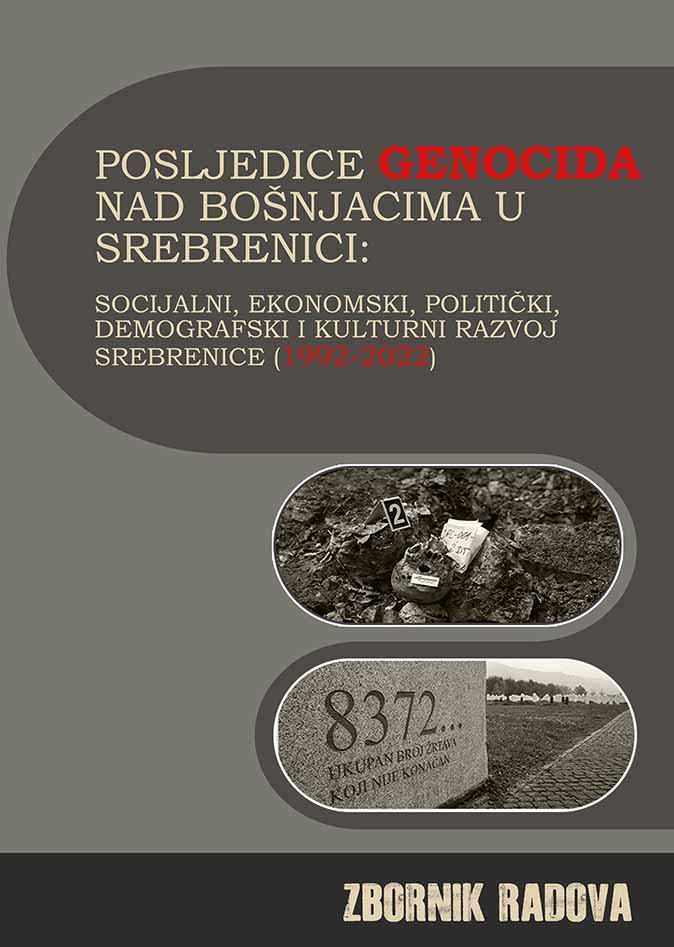
Općina Srebrenica nalazi se u istočnom dijelu Bosne i Hercegovine. Graniči s općinama: Bratunac na sjeveru i sjeveroistoku, Višegrad i Rogatica na jugozapadu, općinom Milići (dio bivše općine Vlasenica) na zapadu, a na jugu granica ide rijekom Drinom u dužini od 40 km koja je i međunarodna granica između Bosne i Hercegovine i Republike Srbije. Površina teritorije općine Srebrenica je 529,83 km2. Prema popisu stanovništva 1991. godine na prostoru općine Srebrenice živjelo je ukupno 36.666 stanovnika ili 0,84% od ukupnog stanovništva Bosne i Hercegovine. Bošnjaka je bilo 27.572 ili 75,20%, Srba 8.315 ili 22,70% i ostalih 779 ili 2,12%1. Gustina naseljenosti u općini iznosila je 69,6 st/km2 (u Bosni i Hercegovini 85,6 st/km2). U političko-administrativnom pogledu 1991. godine Srebrenica je imala 19 mjesnih zajednica u kojima se nalazilo 80 naselja od kojih je jedno pripadalo gradskom, a 79 seoskom tipu naselja. Prema prirodnom priraštaju koji je iznosio 13,2‰ 1991. godine, općina Srebrenica bila je na petom mjestu u Bosni i Hercegovini i to poslije općina Žepče, Velika Kladuša, Živinice i Kalesija. U periodu 1992‒1995. godine na području općine Srebrenica, kao i na prostoru cijele Bosne i Hercegovine, dogodile su se krupne demografske promjene. Masovni zločini koje su nad nedužnim bošnjačkim stanovništ-vom vršile tzv. Vojska RS i policija RS, pod vojnom komandom ratnog zločinca Ratka Mladića i političke direktive ratnog zločinca Radova-na Karadžića, dostigle su vrhunac u općini Srebrenica kada su srpske oružane formacije okupirale “sigurnu zonu UN-a” Srebrenicu, jula 1995. godine, i počinile genocid nad nedužnim bošnjačkim stanovništvom.
More...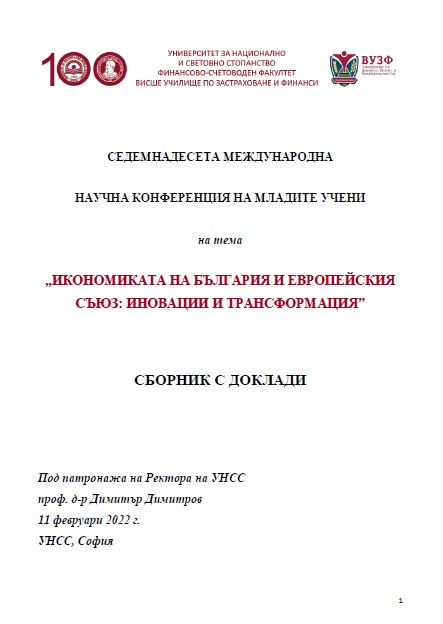
The growing trend of an aging population in Europe highlights the challenges, innovations and new policies needed to improve the lives of older people. The development and use of the available labour potential of all people of working age is an important task to address demographic challenges. We need to prepare and adapt to reality by accepting people over 60+, and sometimes over 50+, as a resource important to society, not a burden. In the conditions of the modern changes two tendencies in relation to the aging population stand out: the opportunity to be useful both for themselves and for society in the new realities, taking into account their activity and "common sense"; the development of the "silver economy", which includes all economic activities related to production, health, social, educational and other services designed to meet the needs and improve the quality of life of older people. The impact of population aging is presented in this report; the concept of the "silver economy" is considered, including a wide range of activities that meet the needs of older people as consumers and presents good innovative practices developed and implemented in some EU member states.
More...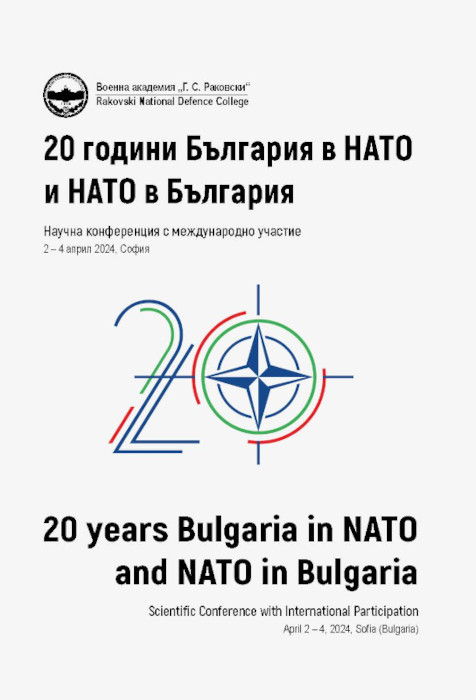
The article explains the essence of Iran’s policy in the Caspian-Black Sea region. In the context of the geopolitical structure of this huge region, the strengths and weaknesses of Iran’s foreign policy are examined, the factors threatening its national security and adequate steps against them are characterized. Especially after the Second Karabakh War, Iran’s relations with Azerbaijan and Armenia are subject to deep analysis.
More...
The report presents the results of the analysis of conceptual approaches and ways to achieve dominance in the Black Sea space and establish a sustainable security environment between NATO and Russia. It examines the directions underlying the development of the Western and Eastern model concepts from the years of the Cold War to Russia‘s invasion of Ukraine. An assessment of the geostrategic orientation and geopolitics of the member and partner countries of NATO in the Black Sea Basin is also presented, drawing conclusions regarding the interconnections and interdependencies between them and the peculiarities of the factors shaping the security environment in the region.
More...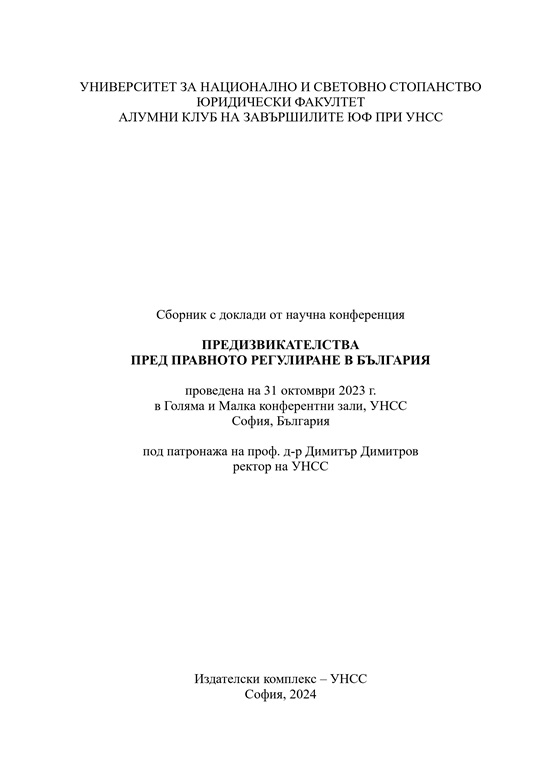
The article will examine the issue of the basic obligation of the state to ensure the basic right of free movement regulated in Art. 35, paragraph 1 of the CRC in the application of Art. 162 RTL. A review of the practice of the Constitutional Court of the Republic of Bulgaria regarding the provision of the right to free movement will be carried out. In conclusion, a reasoned conclusion will be reached, does it contradict Art. 162 RTL of the Constitution of the Republic of Bulgaria. The question will be raised regarding the need for de lege ferenda of Art. 162 RTL in the part in which it covers the application to Bulgarian citizens with a foreign national license to drive a motor vehicle, issued by a country that is not a member of the European Union, or by another state party to the Agreement on the European Economic Area, or from the Swiss Confederation.
More...